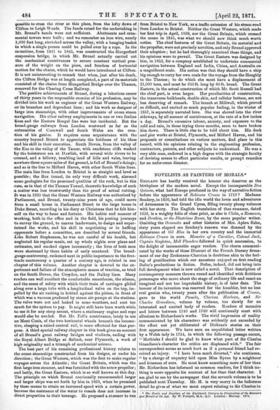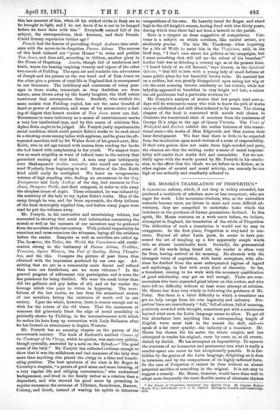NOVELISTS AS PAINTERS OF MORALS.* ENGLaarn has hardly received the
honour she deserves as the birthplace of the modern novel. Except the incomparable Don Quixote, what had Europe produced in the way of narrative fiction before the appearance of Robinson Crusoe in 1719? Madame Scudery, in 1650, had told the idle world the loves and adventures of Artamenes in the Grand Cyrus, filling twenty plump volumes with her story. The English translation of that romance, dated 1633, is a weighty folio of close print, as also is Clelia, a Romance, and Ibrahim, or the.Illustriow Bassa, by the same popular writer. Omitting the Oroonoko and other histories of Mrs. Aphra Behn, sixty years elapsed ere Scudery's renown was dimmed by the appearance of Gil Bias in her own country and the immortal Robinson Crusoe in ours. Memoirs of a Cavalier, Colonel Jack, Captain Singleton, Moll Flanders followed in quick succession, to the delight of innumerable eager readers. The charm communi- cated by the works of those Dioscuri of the French literary firma- ment of our day Erckmann-Chatrian is doubtless akin to the feel- ing of gratification which our ancestors enjoyed on first reading Defoe's productions in fiction. Defoe, indeed, did not bring into full development what is now called a novel. That description of contemporary manners thrown round and identified with fictitious personages who move about the stage of ordinary life and enact an imagined and not too improbable history, is of later date. The honour of its invention was reserved for the humbler, but no less real genius who, twenty years after the publication of Crusoe, gave to the world Pamela, Clarissa Thrlowe, and Sir Charles Graudison, volume by volume, too slowly for an interested and excited body of readers. Readers of memoirs and letters between 1740 and 1760 will continually meet with allusions to Richardson's works. The vivid impression of reality communicated by his characters was evidently not exceeded by the effect not yet obliterated of Dickens's stories on their first appearance. We have seen an unpublished letter written by a Welsh lady in 1754, in which the following passage occurs, "Methinks I should be glad to know what part of Sir Charles Grandison's character the critics are displeased with." The fair correspondent seems as much hurt as if a personal friend had re- ceived an injury. " I have been much diverted," she continues, "by a charge of coquetry laid upon Miss Byron by a neighbour and kinsman of ours. He must know something more of her than Mr. Richardson has informed us common readers, for I think no- thing is more opposite his account of her than that character. I am glad to see by the newspaper that the seventh volume is to be published next Thursday. Mr. H. is very merry in the ludicrous detail he gives of what we must expect relating to Sir Charles in
The Novets and Novelists of the Eighteenth Century in Illustration of the Manners and Morals of the Age. By W. Forsyth, M.A., Q.C. London : Murray. 1871.
this last account of him, when all his wicked tricks in Italy are to be brought to light, and I do not know if he is not to be hanged before we have done with him." Everybody seemed full of the subject, the correspondents, their kinsmen, and their friends. Could literary reputation further ago ?
Pamela had the honour of provoking Joseph Andrews into exist- ence with the never-to-be-forgotten Parson Adams. The success of this book induced our "prose Homer" to write and publish Tom Jones, and thus add, according to Gibbon, another glory to the House of Hapsburg. Amelia, though full of tenderness and truth, wants the bracing inspiring vivacity and vigour of the other two novels of Fielding. The open-air and roadside-inn adventures of Joseph and the parson on the one hand and of Tom Jones on the other give a picture of rural life in England that is unsurpassed in our literature. The indelicacy and coarseness, of many pass- ages in these works, transcripts as they doubtless are from nature, seem blown away by the hearty laughter, the bluff robust merriment that accompanies them. Smollett, who studied the same models that Fielding copied, has not the same breadth of hand or power of execution, and some of his scenes excite a feel- ing of disgust that honest readers of Tom Jones never can feel. Recurrence to mere indecency as a means of entertainment marks a very low intellectual type, and by this canon of criticism Mrs. Aphra Behn ought to be judged. Mr. Forsyth justly reprobates the social condition which could permit Behn's works to be read aloud in a drawing-room among ladies with applause, and he gives the oft- repeated anecdote told by Sir Walter Scott of his grand-aunt, Mrs. Keith, who in old age turned with nausea from reading the books she had heard with complacency in her youth. We suspect there was as much stupidity as want of refined taste in the society that permitted reading of that kind. A man may pass indulgently over Shakespeare's doubles entendres who would not endure to read Wycherly from beginning to end. Stories of the Mrs. Keith kind could easily be multiplied. We knew an octogenarian veteran of high standing who, finding no amusement in the Guy Livingstones and Lady Audkys of the day, had recourse to Tom Jones, Peregrine Pickle, and their compeers, in order to wile away the sleepless hours of night. These exhausted, he was induced by the notoriety of the lady to try Aphra Behn's works. Man of the tamp though he was, and far from squeamish, the dirty dullness of the book thoroughly repelled him, and before many pages were read he put the volumes away.
Mr. Forsyth, in his instructive and entertaining volume, has succeeded in showing that much real information concerning the morals as well as the manners of our ancestors may be gathered from the novelists of the last century. With judicial impartiality he examines and cross-examines the witnesses, laying all the evidence before the reader. Essayists as well as novelists are called up. The Speatator, the Tatter, the World, the Connoisseur add confir- mation strong to the testimony of Parson Adams, Trulliber, Trunnion, Squire Western, the Fool of Quality, Betsey Thought- less, and the like. Compare the picture of past times thus obtained with the impression produced by our own age. Ad- mitting that we are as a community more decent and refined than were our forefathers, are we more virtuous ? In the general progress of refinement vice participates, and is none the less poisonous for being distilled. We wear the mask better than did the gallants and gay ladies of old, and so far render the homage which vice pays to virtue in hypocrisy. The reve- lations of the law courts, no less than the sensational stories of our novelists, betray the existence of much evil in our society. Upon the whole, however, there is reason enough not to wish for the return of the old times. That the coarseness of manners did grievously blunt the edge of moral sensibility is pointedly shown by Fielding, in the unconsciousness with which he makes his hero keep up .connection with Lady Bellaston after he has formed an attachment to Sophia Western.
Mr. Forsyth has an amusing chapter on the parson of the seventeenth century. The book of Eachard's entitled Causes of the Contempt of the Clergy, which he quotes, was once very pithily, though cynically, answered by a note on the flyleaf,—" The good sense of the laity." Mr. Forsyth has collected evidence enough to show that it was the selfishness and bad manners of the laity that snore than anything else placed the clergy in a false and h sting position. The best specimen of the class is Sir Roger de 'Coverley's chaplain, "a person of good sense and some learning, of very regular life and obliging conversation," who understood backgammon; and lived in the family rather as a relation than a dependent, and who showed his good sense by preaching in regular succession the sermons of Tillotson, Saunderson, Barrow, Calamy, and South, instead of wasting his spirits in laborious compositions of his own. He heartily loved Sir Roger, and stood high in the old knight's esteem, having lived with him thirty years, during which time there had not been a lawsuit in the parish.
Here is a chapter on dress suggestive of comparisons. Cos- tume is a subject on which novelists, like careful artists, are studiously precise. The late Mr. Thackeray, when inquiring for a life of Wolfe to assist him in the Virginians, said, in his bluff way, "I don't care about his politics or his campaigns, but I want something that will tell me the colour of his breeches !" Ladies' hair was as deluding a century ago as at the present time. "I heard lately of an old baronet," says Graves, in the Spiritual Quixote, "that fell in love with a young lady of small fortune at some public place for her beautiful brown locks. He married her on a sudden, but was greatly disappointed upon seeing her wig or ate the next morning thrown carelessly on her toilette, while her ladyship appeared at breakfast in very bright red hair, a colour the old gentleman had a particular aversion to."
Mr. Forsyth's analysis of stories that few people read now-a- days will be welcome to many who wish to know the pith of works once so celebrated and still often referred to by name. The closing chapter of the book is concerned with novels well chosen to illustrate the transitional state of manners from the coarseness of George IL's reign to the age of Queen Victoria. The Vicar of Wakefield and Evelina exhibit the earlier features of this transi- tional state—the works of Miss Edgworth and Miss Austen their later development. 'We fear that there is little to be expected from the inculcation upon novel-writers of a sense of responsibility. If their own genius does not make them high-minded and pure, the chances are that the writing under a sense of moral responsi- bility will render their works dull and unreadable. Yet we cor- dially agree with the words quoted by Mr. Forsyth in his conclu- sion, to the effect that the ideals we set before us in fiction, as in other regions of mental and moral activity, can scarcely be too high or too ardently and steadfastly adhered to.



































 Previous page
Previous page